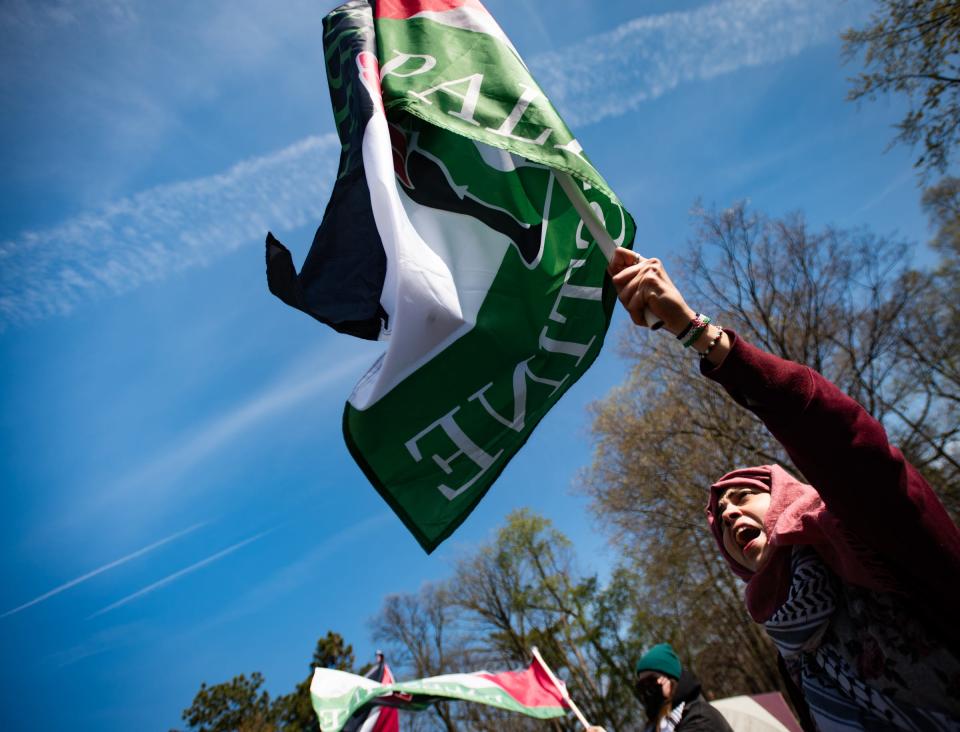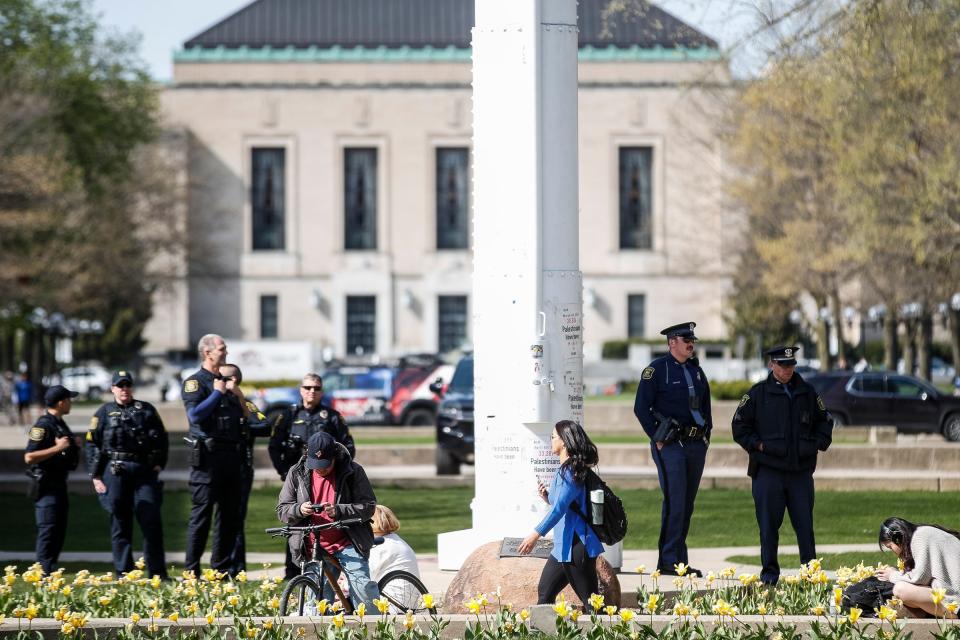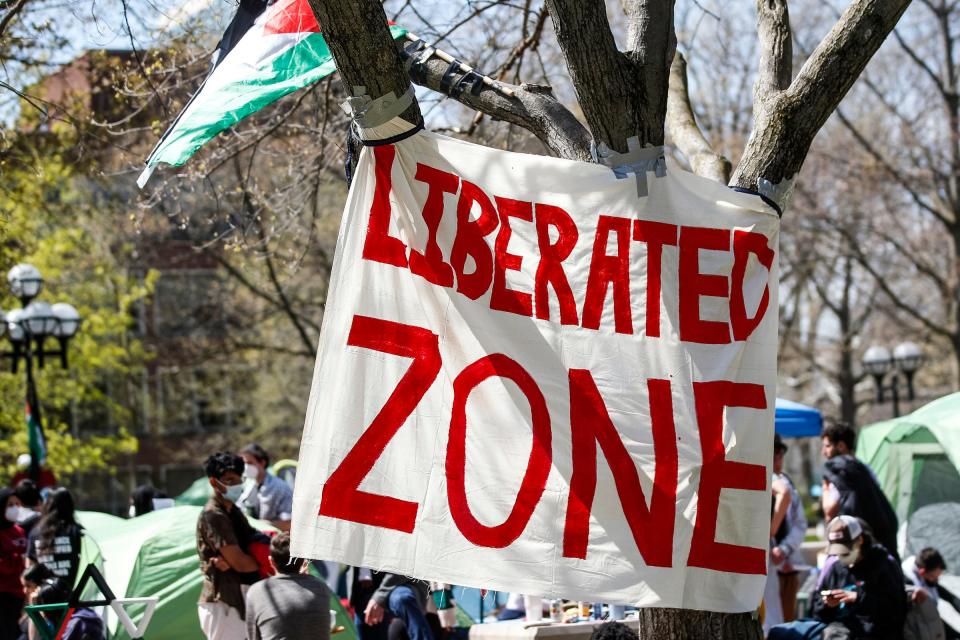Campus protests against Gaza attacks continue in Michigan amid national crackdown
Amid a national crackdown on campus protests supporting Palestinians and calling for divestment from Israel that have resulted in about 2,300 arrests, a tent encampment at the University of Michigan in Ann Arbor set up almost two weeks ago has remained standing with commencement ceremonies set for Saturday that may see additional demonstrations.
And Wayne State University officials on Friday defended the actions of campus police who made one arrest after removing protesters accused of disrupting a Board of Governors meeting attended by the university president.
"The camp size varies throughout the day and night from 30-100" people, University of Michigan Deputy Police Chief Melissa Overton said Friday afternoon of the encampment at the Diag in Ann Arbor. "We have not made any arrests."
Overton did not comment on what their possible plans were for the encampment, saying that the department does not discuss strategy. Lt. Rene Gonzalez of the Michigan State Police said they have been assisting university police as they do for other events. He did not comment further on future plans for the encampment.
At universities across the country, students have set up camps and protested, calling for divestment from Israel over its actions in Gaza that have resulted in thousands of deaths. In other states, such as in California at UCLA and in New York at Columbia University, police this week have raided protest camps, resulting in numerous arrests that have brought criticism from some civil rights advocates and elected officials, including U.S. Rep. Rashida Tlaib, D-Detroit, and praise from some Republicans such as House Speaker Mike Johnson. In Michigan, the tent encampments in Ann Arbor and at Michigan State University have not resulted in police crackdowns, but police did make one arrest on April 26 at Wayne State University that drew criticism from many faculty members in a letter. Organizers of the encampment at Michigan State University voluntarily ended it April 27, reported a student newspaper, The State News.
An April 30 letter signed by more than 100 professors and other faculty members at Wayne State read: "We ... unequivocally denounce the actions of university officials in perpetrating violence against the students of this university at the April 26 Board of Governors meeting. We particularly condemn President Kimberly Espy and the Board of Governors, who looked on silently as a large group of ... students were assaulted and violated by campus police and security."
The letter alleged that "plainclothes police and security, some of whom were planted in the audience, rapidly and aggressively moved against the students. The President and Board looked on without emotion as the officers they oversee forcefully cleared the room of Arab, Muslim, and Jewish students, faculty, and community supporters. Campus police, in violation of their own protocol, flagrantly laid their hands on female students who were doing nothing more than chanting. One student was inexplicably arrested, even though students never received any order to vacate or disperse."

The letter added "the attacks embody the latest wave of racist and McCarthyite repression against students on campuses across the United States."
A Wayne State University spokesman released a statement Friday on behalf of the university that painted a different picture and criticized the protesters.
The Wayne State statement said that "more than a dozen public comment speakers exemplified Wayne State’s values and provided robust remarks."
But "after transitioning to the business portion of the meeting, a group of protesters inside the crowded room locked their arms and announced, via a megaphone, that they were taking control of the meeting," Wayne State said in its Friday statement. "Their actions halted the meeting and prevented it from continuing. At the same time, additional protesters locked their arms, blocking the only two exits. For a short time, no one was able to leave the room. Recognizing a real threat to the safety of everyone there, WSUPD (Wayne State University Police Department) approached the protesters, identified themselves as police, asked the protesters to leave, and ultimately removed them from the room."
The statement said one protester, not a student at Wayne State, was "was briefly detained, cited for disorderly conduct, and released."

Wayne State added that while "we will continue to support the free speech of everyone in our community ... we are also responsible for ensuring the safety of our campus and our ability to carry out normal operations."
A report in the South End, the campus newspaper, said the student who was arrested attended Oakland Community College and was charged with disorderly conduct. The meeting included public comments made in favor of divestment before the clashes.
The protests at the University of Michigan echo demonstrations held about 40 years ago calling for divestment from South Africa. In March 1986, a group of Michigan students constructed a shanty at the Diag to symbolize the suffering of Black people under apartheid in South Africa, calling upon the university to divest from companies doing business in the country, the Free Press reported.
In 1983, the state of Michigan enacted a law requiring public universities and colleges to divest from South Africa and sell their investments in companies that do business in South Africa, such as General Motors. But the University of Michigan fought back against the new law, filing a lawsuit against the state saying the law restricted their constitutional autonomy. The university's regents eventually voted in October 1988 to fully divest from South Africa. The university divested from tobacco in 2000 and disinvested from fossil fuels in 2021. In 2022, the university said it would end future investments in Russia.
In 1978, Michigan State University became one of the first universities in the U.S. to divest from South Africa.

UAW President Shawn Fain, the leader of a union headquartered in Detroit, posted a thread this week on X expressing support for pro-Palestinian protesters, writing on May 1: "The UAW will never support the mass arrest or intimidation of those exercising their right to protest, strike, or speak out against injustice. Our union has been calling for a ceasefire for six months. This war is wrong, and this response against students and academic workers, many of them UAW members, is wrong." Fain in December compared the struggles of Palestinians to the struggles against apartheid in South Africa.
Efforts in Michigan to divest from Israel have faced stiff challenges in recent years.
In 2017, a law went into effect in Michigan that prevents public contracts with anyone who supports divestment from or boycotting Israel.
More: During Passover and NFL draft, Michigan protests were held on both sides of war in Gaza
The Tahrir Coalition, which organized the tent encampment in Ann Arbor, did not respond to messages seeking comment. Organizers with Tahrir have been asking to meet with university regents to discuss divesting from Israel. An email sent Friday afternoon to the regents was not immediately returned. In recent weeks, a popular Islamic cleric based in Texas, Omar Suleiman, addressed the encampment via video and the religious leader at the Islamic Center of Detroit, Imam Imran Salha, spoke at the encampment, reported the Michigan Daily.
For Saturday's commencement, the university announced on its website certain restrictions that include a "prohibition of banners, flags and anything that obstructs sightlines." The university said that while it respects free speech and recognizes the history of protests at commencement, "if protests significantly impede the program, leadership will take steps to de-escalate and address the interruption."
Contact Niraj Warikoo: [email protected] or X @nwarikoo.
This article originally appeared on Detroit Free Press: Protests against Israel continue in Michigan amid national crackdown
